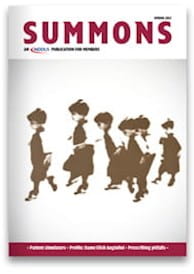I HESITATED before choosing the Francis Inquiry as my subject for this issue’s column. Knowing that thousands of words have been written about the events that led to the Inquiry and the ensuing reports, I wondered both what I had to offer the vast commentary that has been published and whether readers would feel it was one article too many on a painful subject.
Yet, one phrase insistently played on my mind: quality of care is everyone’s responsibility and can therefore all too easily become nobody’s responsibility in the NHS. It occurred to me that in believing that others had provided sufficient attention to the subject, I was inadvertently mirroring the ‘everybody and nobody’ approach. For if we leave it to others to engage with, and reflect on, failures of care, we abrogate our own fundamental responsibilities to patients, colleagues and society. Whatever our role, be it academic, clinical, political or personal, we are all carers and patients at some point in our lives. Moreover, an exclusive focus on ‘role’ is too often a convenient way of protecting ourselves and displacing the difficult.
The more I have read about, and reflected on, the second Francis Inquiry report, the more I have felt that an effective response is probably a matter of both striking simplicity and daunting complexity. The simplicity lies in the report’s call to compassion. In the litany of individual suffering and neglect, the common element was that each of those people deserved, but did not receive, compassion from those responsible for their care. I do not believe that there is a single instance described in the Francis Report where compassion could not have prevented the distress experienced by patients and families.
What was missing was simple and its absence was devastating. Compassion does not depend on an extensive academic analysis or years of training. And yet, there is a complexity to compassion. The concepts of ‘compassion fatigue’ and ‘burnout’ will be familiar to many and are well-documented. These are not merely academic constructs: the demands of providing clinical care, particularly in a resource-constrained and politicallyvolatile system, are considerable. Add in the vicissitudes of life that are likely to influence how anyone functions at work and most professionals will be at risk of a diminution in compassion at certain points in their careers.
But, I would suggest that there is another aspect to compassion that is not much discussed, namely that compassion involves unsettling, even painful, moral imagination and emotional engagement. I realised this most recently when I asked a small group of medical students to write a first person piece imagining what it might be like to be a vulnerable patient in a particular situation. The students began the task in good humour, but I was aware of a change in mood as they wrote. When they shared their words with each other, there was a heavy silence in the room. I felt myself emotionally affected by what the students had written.
The exercise moved us all: not just emotionally, but in terms of our roles and relationships. I was no longer just the facilitator of an academic session and the students were no longer just learners. Our relationship and its boundaries were altered. We were human beings exploring new terrain in which we felt and shared strong emotions. As we collectively considered vulnerability, we became vulnerable. And that was discomforting.
Real compassion demands much of us. It requires sincerity. Compassion that is not genuine is illusory and fragile. Compassion depends on us being willing to take risks with our own emotions and professional identities. It is hard work. Compassion demands that we put the interests of others before our own. It is an unpredictable entity that is shaped by subjectivity and particularism: one patient’s needs and preferences will differ from another’s. We won’t always succeed in being compassionate, however high our aspirations, and that too is an uncomfortable realisation. It is influenced by myriad factors that characterise life in the NHS such as stress, hierarchy and politics. It is accepted by most as being fundamental to healthcare and yet, as Francis demonstrates, its absence is sometimes neither noticed nor addressed even in the face of incontrovertible evidence.
How then to reconcile the ‘everyone and no one’ conundrum? As a first step, we should all reflect on our own capacity for compassion. Most readers won’t have worked at Mid-Staffordshire NHS Trust, but we all have a duty to engage with its lessons – in all their glorious simplicity and complexity. For, it is surely the case that compassionate care cannot become ‘everyone’s responsibility’ unless and until we each take individual responsibility.
Deborah Bowman is Professor of Bioethics, Clinical Ethics and Medical Law at St George’s, University of London
This page was correct at the time of publication. Any guidance is intended as general guidance for members only. If you are a member and need specific advice relating to your own circumstances, please contact one of our advisers.
Read more from this issue of Insight

Save this article
Save this article to a list of favourite articles which members can access in their account.
Save to library